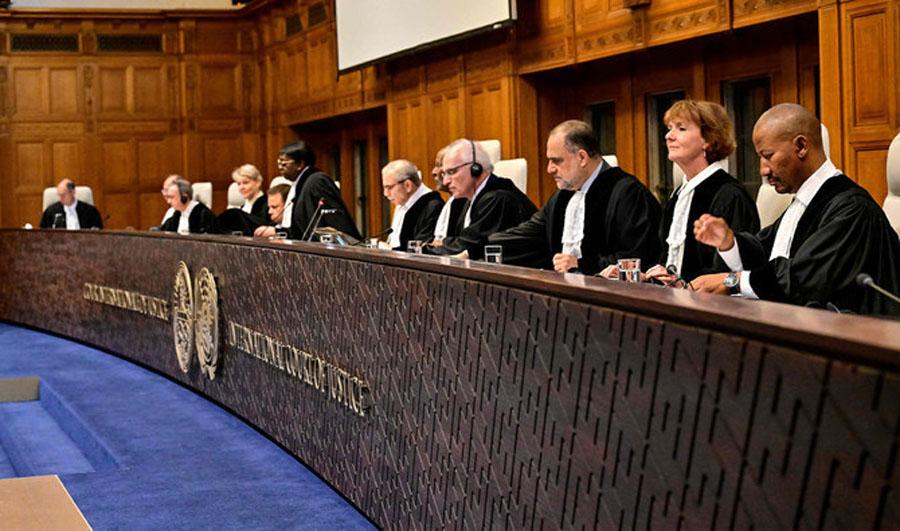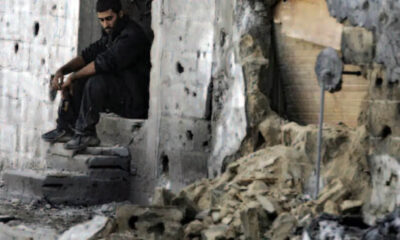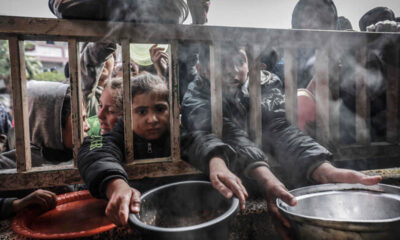International
Israel’s presence in occupied Palestinian territories illegal – UN court

Israel’s presence in occupied Palestinian territories illegal – UN court
THE HAGUE, Netherlands: The top UN court said Friday that Israel’s presence in the occupied Palestinian territories is “unlawful” and called on it to end and for settlement construction to stop immediately, issuing an unprecedented, sweeping condemnation of Israel’s rule over the lands it captured 57 years ago.
Israeli Prime Minister Benjamin Netanyahu quickly denounced the nonbinding opinion issued by the 15-judge panel of the International Court of Justice, saying the territories are part of the Jewish people’s historic “homeland.” But the resounding breadth of the decision could impact international opinion and fuel moves for unilateral recognition of a Palestinian state.
The judges pointed to a wide list of policies, including the building and expansion of Israeli settlements in the West Bank and east Jerusalem, use of the area’s natural resources, the annexation and imposition of permanent control over lands and discriminatory policies against Palestinians, all of which it said violated international law.
The court said Israel had no right to sovereignty in the territories, was violating international laws against acquiring territory by force and was impeding Palestinians’ right to self-determination. It said other nations were obliged not to “render aid or assistance in maintaining” Israel’s presence in the territories. It said Israel must end settlement construction immediately and that existing settlements must be removed, according to a summary of the more than 80-page opinion read out by court President Nawaf Salam.
Israel’s “abuse of its status as the occupying power” renders its “presence in the occupied Palestinian territory unlawful,” the court said, saying its presence must be ended as “rapidly as possible.”
READ ALSO:
- Rivers: Appeal Court dismisses suit against Tinubu, Fubara, others
- Dele Momodu, Doyin Okupe disagree over Tinubu administration’s policies
- Fed govt unveils roadmap for Africa’s digital revolution under AfCFTA
The court’s opinion, sought by the UN General Assembly after a Palestinian request, came against the backdrop of Israel’s devastating military assault on Gaza, which was triggered by the Hamas-led attacks in southern Israel on Oct. 7. In a separate case, the International Court of Justice is considering a South African claim that Israel’s campaign in Gaza amounts to genocide, a claim that Israel vehemently denies.
The court said the General Assembly and Security Council — where staunch Israeli ally the United States holds a veto — should consider “the precise modalities” to end Israel’s presence in the territories.
Israel, which normally considers the United Nations and international tribunals as unfair and biased, didn’t send a legal team to the hearings. Instead, it submitted written comments, saying that the questions put to the court are prejudiced and fail to address Israeli security concerns. Israeli officials have said the court’s intervention could undermine the peace process, which has been stagnant for more than a decade.
“The Jewish people are not conquerors in their own land — not in our eternal capital Jerusalem and not in the land of our ancestors in Judea and Samaria,” Netanyahu said in a statement issued by his office, using the biblical terms for the West Bank. “No false decision in The Hague will distort this historical truth and likewise the legality of Israeli settlement in all the territories of our homeland cannot be contested.”
Speaking outside the court, Riad Malki, an adviser to Palestinian President Mahmoud Abbas, called the opinion “a watershed moment for Palestine, for justice and for international law.”
He said other nations must now “uphold the clear obligations” outlined by the court. “No actions of any kind … to support Israel’s illegal occupation.”
Hamas welcomed the court’s decision and said in a statement that “serious steps on the ground” need to be taken in response.
Israel captured the West Bank, east Jerusalem and Gaza Strip in the 1967 Mideast war. The Palestinians seek all three areas for an independent state.
Israel considers the West Bank to be disputed territory, whose future should be decided in negotiations, while it has moved populations there in settlements to solidify its hold. It has annexed east Jerusalem in a move that isn’t internationally recognized, while it withdrew from Gaza in 2005 but maintained a blockade of the territory after Hamas took power in 2007. The international community generally considers all three areas to be occupied territory.
READ ALSO:
- Refinery: Dangote defends product quality, says diesel 80% better than imported ones
- Arrest Philip Shaibu now over airport shooting, Edo govt tells police
- BREAKING: FCCPC fines Meta platforms $220m over ‘discriminatory practices’ in Nigeria
The court’s decision strikes at the heart of the ambiguity of Israel’s administration of the territories. Israel hasn’t annexed the West Bank — though settler groups have pressed it to do so — but it calls it part of its homeland and has effectively treated it as an extension of the nation. Along with the settlements, it has appropriated large swaths of the territory as “state lands.” At the same time, Netanyahu’s government has repeatedly rejected the creation of any Palestinian state. Abbas’ Palestinian Authority has been restricted to control over divided enclaves scattered around the West Bank.
The Palestinians presented arguments at hearings in February, along with 49 other nations and three international organizations. In the hearings, Malki accused Israel of apartheid and urged the United Nations’ top court to declare that Israel’s occupation of lands sought by the Palestinians is illegal and must end immediately and unconditionally for any hope for a two-state future to survive.
Erwin van Veen, a senior research fellow at the Clingendael think tank in The Hague, said before the decision that a ruling that Israel’s policies breach international law would “isolate Israel further internationally, at least from a legal point of view.”
He said such a ruling would remove “any kind of legal, political, philosophical underpinning of the Israeli expansion project.” It could also increase the number of countries that recognize a Palestinian state, in particular in the Western world, following the recent example of Spain and Norway and Ireland, he said.
It’s not the first time the ICJ has been asked to give its legal opinion on Israeli policies. Two decades ago, the court ruled that Israel’s West Bank separation barrier was “contrary to international law.” Israel boycotted those proceedings, saying they were politically motivated.
Israel says the barrier is a security measure. Palestinians say the structure amounts to a massive land grab, because it frequently dips into the West Bank.
The court said that Israel’s construction of settlements in the West Bank violated international laws prohibiting countries from moving their population into territories they occupy.
Israel has built well over 100 settlements, according to the anti-settlement monitoring group Peace Now. The West Bank settler population has grown by more than 15 percent in the past five years to more than 500,000 Israelis, according to a pro-settler group. Their residents are Israeli citizens governed by domestic law and served by government ministries, services, banks and other businesses — effectively integrating them into Israel.
Israel also has annexed east Jerusalem and considers the entire city to be its capital. An additional 200,000 Israelis live in settlements built in east Jerusalem that Israel considers to be neighborhoods of its capital. Palestinian residents of the city face systematic discrimination, making it difficult for them to build new homes or expand existing ones.
The international community considers all settlements to be illegal or obstacles to peace since they are built on lands sought by the Palestinians for their state.
Netanyahu’s hard-line government is dominated by settlers and their political supporters. Netanyahu has given his finance minister, Bezalel Smotrich, a former settler leader, unprecedented authority over settlement policy. Smotrich has used this position to cement Israel’s control over the West Bank by pushing forward plans to build more settlement homes and to legalize outposts.
Israel’s presence in occupied Palestinian territories illegal – UN court
ARAB NEWS
International
Nurse escapes gang-rape attempt in Indian hospital, cuts doctor’s private parts with blade

Nurse escapes gang-rape attempt in Indian hospital, cuts doctor’s private parts with blade
A month after a trainee doctor was raped and m8rdered in Kolkata, India, sparking anger and protests nationwide, a gang-rape attempt was made on a nurse at a private hospital in Bihar.
Police said one of the assaulters is a doctor who is also the administrator of the institution. However, the nurse managed to escape after inflicting a cut on his private parts with a blade.
The nurse was wrapping up work at the RBS Health Care Centre in Gangapur under the Musrighararari police station limits in Samastipur district on Wednesday night when hospital administrator Dr Sanjay Kumar (pictured) and two of his associates – all of whom were drunk – tried to r@pr her.
Trying to free herself from the clutches of Dr Kumar and the others, the nurse used a blade to slash at the doctor’s genitals.
READ ALSO:
- Kidnappers kill hotel owner, manager, guest after collecting N25m ransom
- Five Chinese arrested in Akwa Ibom for illegal mining
- Tito, Michael Jackson’s brother, member of Jackson 5, is dead
She managed to escape and dial the police after hiding in a field outside the hospital
Deputy Superintendent of Police Sanjay Kumar Pandey said a team was rushed to the hospital and, after making sure that the nurse was safe, three people were arrested, including the doctor. The other two accused have been identified as Sunil Kumar Gupta and Awadhesh Kumar.
Mr Pandey said the men had locked the hospital from the inside and turned off the CCTV cameras before trying to s3xually ass@ult the nurse.
“The presence of mind and courage shown by the survivor is praiseworthy,” he said.
The police have recovered half a bottle of liquor, the blade used by the nurse, blood-stained clothes and three cellphones.
Officials said the three men had been drinking before trying to assault the nurse and they will also be charged under prohibition laws because Bihar is a dry state.
Doctor Sanjay is also the organization minister of Hindu Samaj Party.
Nurse escapes gang-rape attempt in Indian hospital, cuts doctor’s private parts with blade
International
Israeli leaflets tell south Lebanon residents to evacuate

Israeli leaflets tell south Lebanon residents to evacuate
BEIRUT: Israel dropped leaflets over a Lebanon border village Sunday urging residents to leave, state-run media said, but Israel’s military told AFP a brigade had taken the initiative without approval.
It was the first time Israelis had told residents of south Lebanon to evacuate in 11 months of cross-border fire between Hezbollah and Israel over the Gaza war, triggered by Hezbollah ally Hamas’s October 7 attack on Israel.
“The Israeli enemy dropped leaflets over Wazzani calling on those in the area and its surroundings to evacuate,” the official National News Agency said, referring to a southern border village.
Wazzani mayor Ahmed Al-Mohammed shared with AFP a picture of the leaflets that showed a map of the region with the areas marked for evacuation marked in red.
The leaflet read in Arabic: “To all residents and refugees living in the area of the camps, Hezbollah is firing from your region. You must immediately leave your homes and head north of the Khiam region before 04:00 p.m. (1300 GMT). Do not return to this area until the end of the war.”
READ ALSO:
- Edo poll: Six persons arrested in Benin hotel with fake PDP letterheads, forged signatures
- Summon elders meeting over Benue APC Crisis, ex-Senate president tells Ganduje
- JUST IN: Northern regions to pay more for petrol after NNPC announces Dangote price
It added: “Anyone present in this area after this time will be considered a terrorist.”
Wazzani is an agricultural region where Syrians are often hired to work the land.
Asked about the incident, an Israeli military spokeswoman said the leaflets had been dropped by drone in an area from which rockets had been fired into northern Israel.
“This was an initiative of the 769 Brigade, it was not approved by the Northern Command. An investigation has been opened,” she added.
In the Gaza Strip, Israeli aircraft regularly drop leaflets urging residents to evacuate before an attack.
On Saturday, Hezbollah’s second-in-command Naim Qassem warned that an all-out war by Israel aimed at returning 100,000 displaced people to their homes in areas near the Lebanon border would displace “hundreds of thousands” more Israelis.
The cross-border violence since early October has killed 623 people in Lebanon, mostly fighters but also including at least 141 civilians, according to an AFP tally.
On the Israeli side, including in the annexed Golan Heights, authorities have announced the deaths of at least 24 soldiers and 26 civilians.
Israeli leaflets tell south Lebanon residents to evacuate
ARAB NEWS
International
Deadly floods hit Central, Eastern Europe

Deadly floods hit Central, Eastern Europe
A firefighter died during a flood rescue in Austria and one person drowned in Poland, as torrential rain caused by Storm Boris continued to wreak havoc across Central and Eastern Europe.
In Romania, five people have died, while several remain unaccounted for in the Czech Republic.
The Austrian province surrounding Vienna has been declared a disaster area, with its leaders speaking of “an unprecedented extreme situation”.
Poland’s prime minister Donald Tusk declared a state of natural disaster.
-

 metro1 day ago
metro1 day agoFG begins free CNG conversion in three Ogun centres
-

 Politics3 days ago
Politics3 days agoI’ve no apologies threatening to destabilise PDP states, says Wike
-

 Business1 day ago
Business1 day agoPetrol: Dangote pump price emerges as NNPC trucks begin loading
-

 Business2 days ago
Business2 days ago100 NNPC trucks arrive at Dangote Refinery to lift petrol, 200 more expected (Photos)
-

 Business2 days ago
Business2 days agoUpdated: Dangote refinery to begin petrol supply Sunday, signs agreement with NNPCL
-

 News1 day ago
News1 day agoDangote fuel supply forces Scotland refinery to announce shutdown date
-

 metro1 day ago
metro1 day agoMen beware – Lack of sex can make your wife miserable, angry
-

 Education2 days ago
Education2 days agoLagos govt raises boarding fee to N100,000/term after parents have paid N35,000













